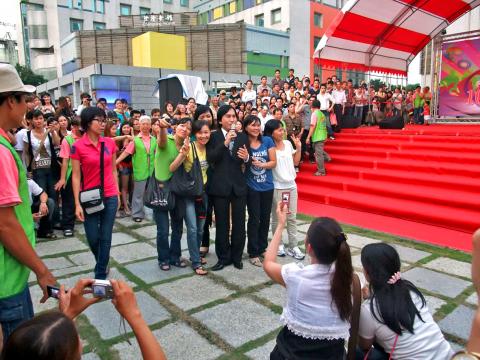The Ministry of Labor is considering lifting a decade-long ban on Vietnamese domestic caretakers in response to an expected decrease in Indonesian migrant workers from 2017.
The plans drew criticism from migrant workers’ advocates, who accused the ministry of evading its responsibility for improving working conditions of domestic caretakers.
A report by the Chinese-language Apple Daily quoted Deputy Minister of Labor Chen I-min (陳益民) as saying that the ban could be lifted by June.

Photo: Wang Jung-hsiang, Taipei Times
His remarks followed earlier comments on introducing workers from Myanmar to mitigate the expected shortfall.
Indonesia’s announcement late last month to gradually stop allowing its nationals to work in Taiwan as domestic caregivers has sent ripples through the nation, as Taiwan relies heavily on Indonesian workers to care for its elderly and disabled people.
As of January, among a total of more than 220,000 domestic caretakers from Southeast Asian countries employed by Taiwanese families, about 170,000 were from Indonesia, accounting for nearly 80 percent.
Vietnamese maritime workers and domestic caretakers were banned by the ministry in 2004 and 2005 respectively, due to a high absconding rate.
Minister of Labor Chen Hsiung-wen (陳雄文) said that occurrences of runaway workers among Vietnamese have decreased since Hanoi introduced stricter punishments last year.
He said the ministry is currently “keeping multiple options” open for new sources of migrant workers to replace those from Indonesia.
Taiwan International Workers’ Association researcher Wu Jing-ru (吳靜如) said that it was “shameful” for Taiwan to ignore demands from foreign governments to protect the labor rights of workers and instead “exploit new sources of cheap labor.”
“We all know that the Indonesian government stopped sending workers because its demands to improve the basic rights of Indonesian workers failed to materialize,” Wu said, adding that foreign caretakers in Taiwan almost never have days off and are required to pay high brokerage fees.
She said many migrant workers absconded because of harsh working conditions and urged the ministry to stop portraying runaway workers as the root of its problems.
Without reforms to guarantee vacation rights and adequate wages, absconding would likely remain common among migrant workers, Wu said, adding that brokerage fees for Vietnamese workers in Taiwan cost up to US$7,000 per person — the most expensive among all migrant worker-providing countries.

DAREDEVIL: Honnold said it had always been a dream of his to climb Taipei 101, while a Netflix producer said the skyscraper was ‘a real icon of this country’ US climber Alex Honnold yesterday took on Taiwan’s tallest building, becoming the first person to scale Taipei 101 without a rope, harness or safety net. Hundreds of spectators gathered at the base of the 101-story skyscraper to watch Honnold, 40, embark on his daredevil feat, which was also broadcast live on Netflix. Dressed in a red T-shirt and yellow custom-made climbing shoes, Honnold swiftly moved up the southeast face of the glass and steel building. At one point, he stepped onto a platform midway up to wave down at fans and onlookers who were taking photos. People watching from inside

A Vietnamese migrant worker yesterday won NT$12 million (US$379,627) on a Lunar New Year scratch card in Kaohsiung as part of Taiwan Lottery Co’s (台灣彩券) “NT$12 Million Grand Fortune” (1200萬大吉利) game. The man was the first top-prize winner of the new game launched on Jan. 6 to mark the Lunar New Year. Three Vietnamese migrant workers visited a Taiwan Lottery shop on Xinyue Street in Kaohsiung’s Gangshan District (崗山), a store representative said. The player bought multiple tickets and, after winning nothing, held the final lottery ticket in one hand and rubbed the store’s statue of the Maitreya Buddha’s belly with the other,

‘COMMITTED TO DETERRENCE’: Washington would stand by its allies, but it can only help as much as countries help themselves, Raymond Greene said The US is committed to deterrence in the first island chain, but it should not bear the burden alone, as “freedom is not free,” American Institute in Taiwan Director Raymond Greene said in a speech at the Institute for National Defense and Security Research’s “Strengthening Resilience: Defense as the Engine of Development” seminar in Taipei yesterday. In the speech, titled “Investing Together and a Secure and Prosperous Future,” Greene highlighted the contributions of US President Donald Trump’s administration to Taiwan’s defense efforts, including the establishment of supply chains for drones and autonomous systems, offers of security assistance and the expansion of

Japan’s strategic alliance with the US would collapse if Tokyo were to turn away from a conflict in Taiwan, Japanese Prime Minister Sanae Takaichi said yesterday, but distanced herself from previous comments that suggested a possible military response in such an event. Takaichi expressed her latest views on a nationally broadcast TV program late on Monday, where an opposition party leader criticized her for igniting tensions with China with the earlier remarks. Ties between Japan and China have sunk to the worst level in years after Takaichi said in November that a hypothetical Chinese attack on Taiwan could bring about a Japanese